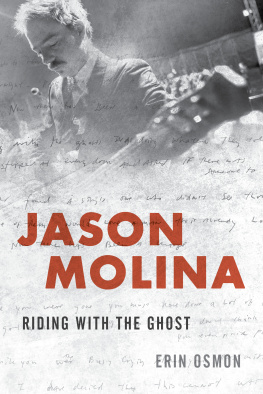Jason Molina
Jason Molina
Riding with the Ghost
Erin Osmon
ROWMAN & LITTLEFIELD
Lanham Boulder New York London
Published by Rowman & Littlefield
A wholly owned subsidiary of The Rowman & Littlefield Publishing Group, Inc.
4501 Forbes Boulevard, Suite 200, Lanham, Maryland 20706
www.rowman.com
Unit A, Whitacre Mews, 26-34 Stannary Street, London SE11 4AB
Copyright 2017 by Erin Osmon
All rights reserved . No part of this book may be reproduced in any form or by any electronic or mechanical means, including information storage and retrieval systems, without written permission from the publisher, except by a reviewer who may quote passages in a review.
British Library Cataloguing in Publication Information Available
Library of Congress Cataloging-in-Publication Data
Names: Osmon, Erin.
Title: Jason Molina : riding with the ghost / Erin Osmon.
Description: Lanham : Rowman & Littlefield, [2017] | Includes bibliographical references and index.
Identifiers: LCCN 2016047509 (print) | LCCN 2016048240 (ebook) | ISBN 9781442268678 (cloth : alk. paper) | ISBN 9781442268685 (electronic)
Subjects: LCSH: Molina, Jason. | SingersUnited StatesBiography. | LCGFT: Biographies.
Classification: LCC ML420.M5558 O86 2017 (print) | LCC ML420.M5558 (ebook) | DDC 782.42164092 [B]dc23 LC record available at https://lccn.loc.gov/2016047509
 The paper used in this publication meets the minimum requirements of American National Standard for Information SciencesPermanence of Paper for Printed Library Materials, ANSI/NISO Z39.48-1992.
The paper used in this publication meets the minimum requirements of American National Standard for Information SciencesPermanence of Paper for Printed Library Materials, ANSI/NISO Z39.48-1992.
Printed in the United States of America
Introduction
The outsider pride beaming from the Midwests underground music culture of the 1990s is sui generis singular in its aestheticthe product of tiny and truly independent scenes that sprang up in small towns stretching from Ohio to Oklahoma, detached from the cultural cache and financial privilege commensurate with big cities dotting Americas coasts. With factory assembly lines and an evangelical hive mind as the driving force of mainstream culture, the Midwest was often devoid of welcoming spaces for teenage punk bands, artists, and anything outsider. As such, upstart acts from the Midwest convened after hours in church basements, park shelters, and VFW banquet halls, blazing musical trails based solely on reimagined sonic cues from cassette dubs and radio-rock record collections inherited from parents. In the pre-Internet era of do-it-yourself music making, many Midwestern kids had limited-to-no access to record store bins and touring bands, which bred creativity through a lens of isolation and fostered a unique community not found outside the confines of the Midwests pastoral plains and industrial emptiness.
Jason Molinas story is a paragon of this Midwest isolation and pride. A musician reared in the heart of the Ohio Rust Belt with a big, singular voice, he both shunned his humble roots and wore them like a badge of honor. Hailing from a tiny town and holding a torch for great country and roots-rock artists, much like Townes Van Zandt and Gram Parsons before him, Molina was a songwriters songwriter, acutely attuned to the beautiful and the absurd in the everyday, penning volumes of profoundly simple lyrics in his abbreviated 39-year life. His self-taught style was charmingly unpolished and noncommercial and his record sales were commensurate with that ethos. Still, the artists, musicians, and appreciators of Molina took to him with fervor, recognizing the prodigious and prolific talent torpedoing from the young man with the old soul. Like Van Zandt and Parsons, Molina left earth largely unheralded in the mainstream, save for his rabid fan base and scant higher profile musician-peers who covered his material after his death. He was neither fashionable nor amenable to the terms of his era, rejecting trends and corporate cash ins, favoring instead a very singular vision centered on his unique and unwavering tenor voice, which shot out of his diminutive 5'6" frame like a rocket. As the 90s gave way to the 00s, Molina looked increasingly to the past for inspiration. As skinny ties returned to vogue, Molina sported bolos. He flew fast from him his hometown of Lorain, Ohio, but never really left; its Great Lakes shorelines and oxidized industrial landscape lived forever in his spirit and in his songs.
After worshipping heavy metal and alternative rock acts in the 80s, Molina reached college and focused on becoming a singer-songwriter. Hed find a trusted coterie of brother-bandmates whod remain loyal throughout the innumerable pranks, pitfalls, and paradoxes that were inevitable when working with Molina.
He found his footing in the progressive campus of Oberlin College, a liberal arts school a stones throw from his hometown, where influential 90s underground bands were incubated. Unlike Molina, these acts tended to favor a louder or faster approach to music making. His stripped down and plaintive performances at house parties often captivated or sank the collective heart of the room, his sets brimming with equal amounts of hope and sadness.
Jason Molinas story cannot be told without that of his label Secretly Canadian, which found its first successes by issuing Molinas records and considered him their flagship. Though the label and Molina parted ways ideologicallythe label climbing and expanding into the global indie realm as Molina increasingly crawled inside of himselfthe partnership lasted into Molinas final days. While Molina continued to churn out low-fidelity music cloaked by depression and uncertainty, the label and its siblings Jagjaguwar and Dead Oceans turned their sights to bigger names like Bon Iver and Antony & The Johnsons, expanding their humble Midwest offices to New York, Los Angeles, and the UK in the process. Still, Secretly Canadians partnership with Molina spanned about thirty records, split among LP, EP, and seven-inch single formats. As Molina traveled from Ohio to Chicago and London, the labels humble home base in Bloomington, Indiana, served as a de facto musical community and incubator for Molina, its tight-knit web of DIY musicians and recording engineers aiding the singer-songwriter into his last days. Its where Molina found his bandmates, his wife, and himself.
Molinas biggest success was his 2003 album The Magnolia Electric Co. , which has been canonized in the contemporary roots-rock songbook. Its songs have been covered by both Grammy nominees and nobodies. Its lyrics and cover art have lasting permanence in CD and vinyl pressings, but also in tattoos on the limbs of Molinas fans.
The albums second song, Ive Been Riding with the Ghost, contains one of Molinas most pointed observations on the human condition. In it he explains the turns and trials along lifes journey to acceptance with oneself, with lovers, and with spectral forces unseenthe many ghosts that ride with us along the way. Molina himself was highly superstitious and convened with both literal and metaphorical ghosts his entire life. These came in late night bed rattlings and homemade altars he fashioned from found objects as well as the ghosts from his troubled childhood and from friends who died in tragic accidents. Molinas own ghost, the alcoholism that pulsed through his familys bloodlines, begat his end. Though his swan sang of tragedy, today he lives on through the songs, his continual ability to write at a hummingbirds clip his only personal measure for success during his short life.
Molina often relied on a preferred collectors set of metaphors, which mirrored the very real events of his life. He sang of moons, trains, ghosts, flowers, wolves, and bells, providing a sort of tactile connection to his studies and surroundings and to the celebration and suffering he felt inside of himself. He was heralded a balladeer of heartbreak, but in reality found tremendous hope in the sad songs he wrote and recorded. Molina often spoke in parable, encouraging his fans to keep the lamps trimmed and burning, and today the multitude of songs he left behind continues to burn. He was a man of supreme solitude and of supreme silliness and every contradictory, hilarious, and devastating thing in between. Today, his name is praised by contemporary roots, Americana, and folk musicians who grew up with his records or discovered them after it was too late. Molina never sold out big theaters like his fans in the Avett Brothers, Band of Horses, and the Frames, but his spirit remains a gigantic presence in the tiny clubs and DIY spaces he inhabited in his many years of road dog touring. His is a story of misfortune but also of achievement, from the heavy metal kid winning battle of bands competitions in Lorain, Ohio, to a man whose extensive oeuvre continues to woo and deeply affect fans old and new.
Next page










 The paper used in this publication meets the minimum requirements of American National Standard for Information SciencesPermanence of Paper for Printed Library Materials, ANSI/NISO Z39.48-1992.
The paper used in this publication meets the minimum requirements of American National Standard for Information SciencesPermanence of Paper for Printed Library Materials, ANSI/NISO Z39.48-1992.